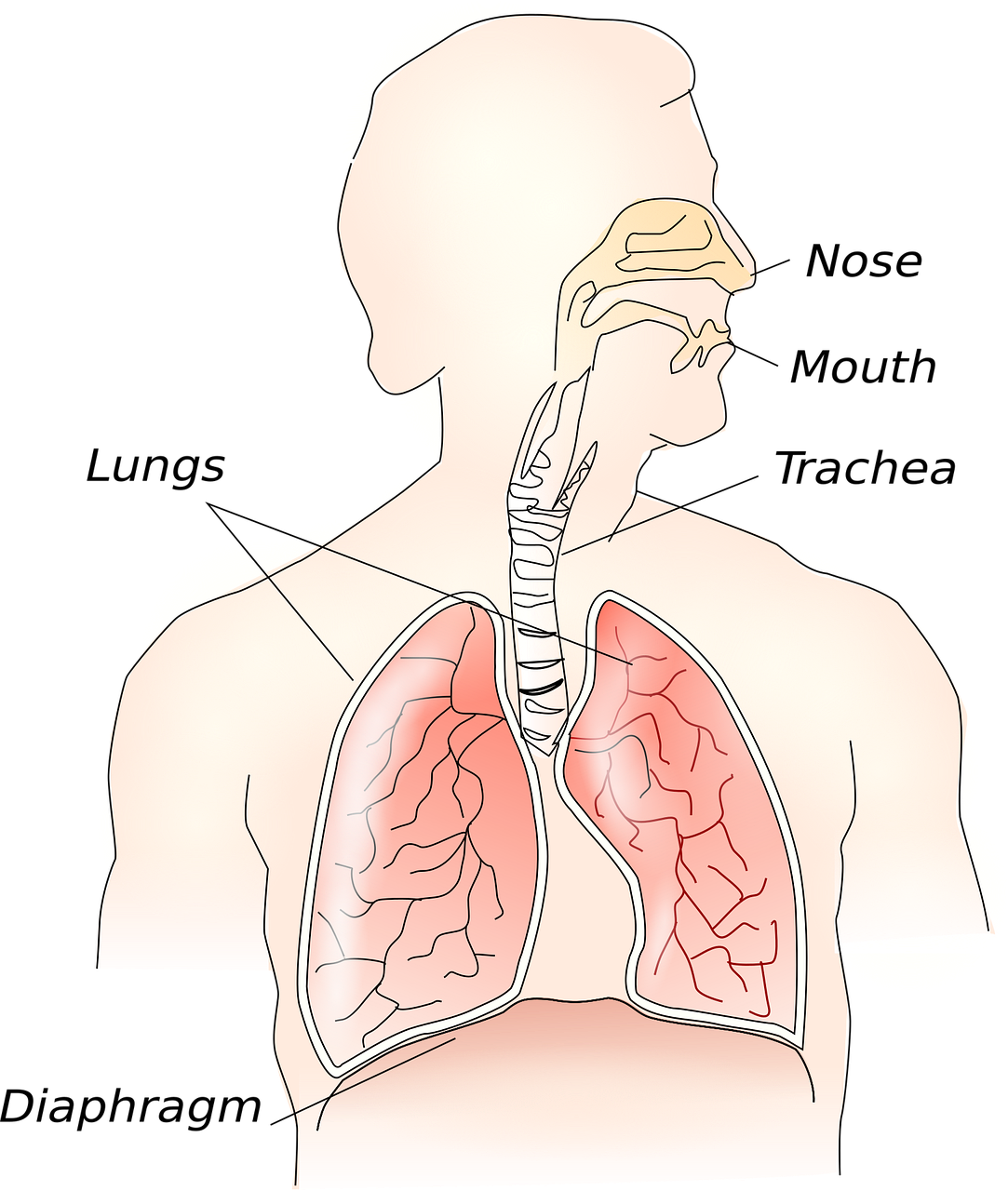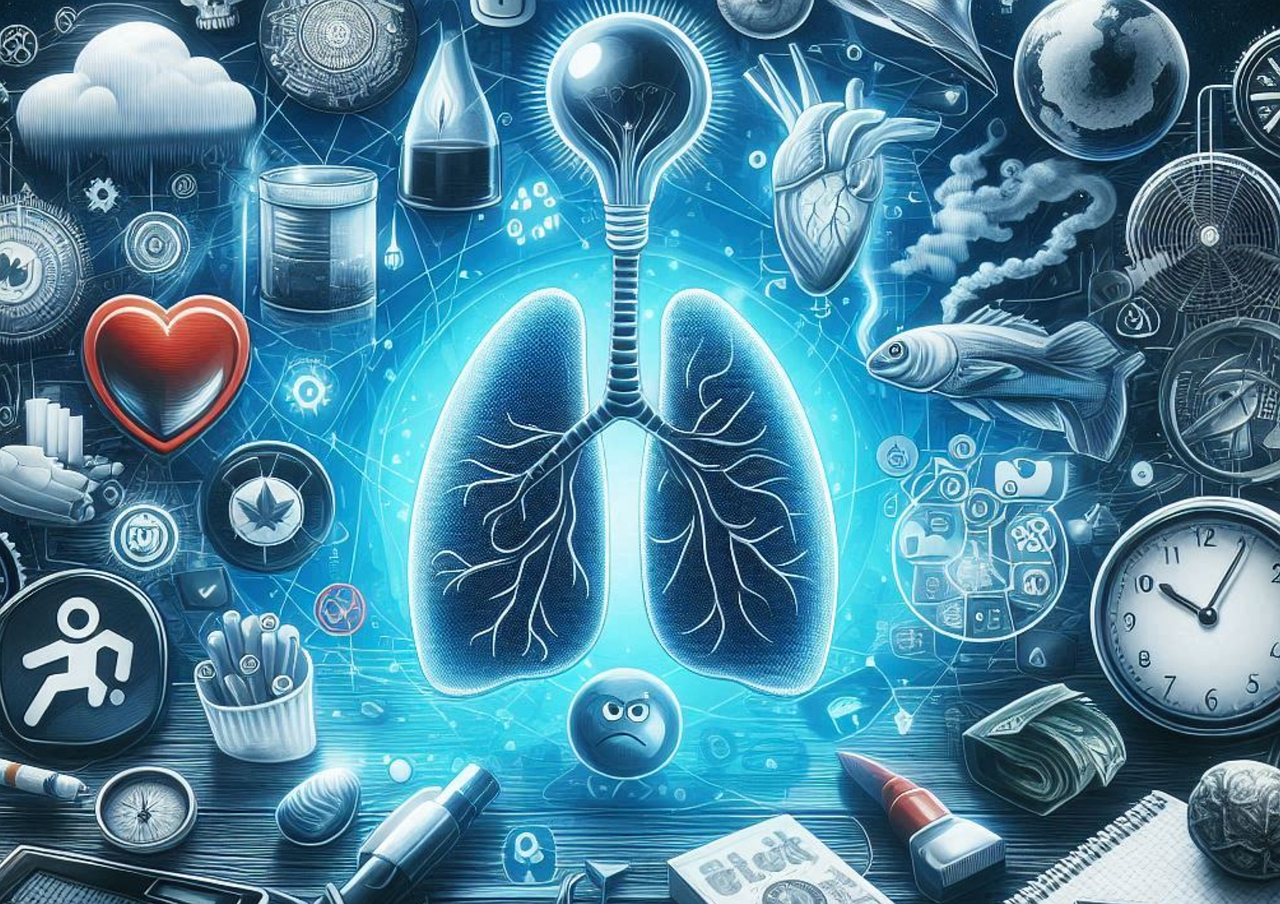Fun With Stress 2.10
Chronic Stress On Our Ability To Breathe
Reading time: 8 minutes
Illustration anatomy model: love4music1972
Our lungs and airways, or respiratory system, are instrumental in our ability to flee or fight from a life threatening situation. However, lungs and airways by themselves are inert; they need muscles in order for us to be able to breathe. And, like most body tissues, lungs and airways also need oxygen to do their job, which is delivered to them by our blood. Thus we immediately see that our respiratory system is closely interconnected with our cardiovascular system and skeletal muscles – two systems that are highly sensitive to stress and the development of dysfunctions when stress becomes chronic.
A logical conclusion, therefore, is that our capacity to breathe does not only depend on the state of our lungs and airways. Moreover, the close interrelatedness of every part of our body – and mind – now becomes apparent.
Breathing Is A Continuous, Cyclic Movement
Our diaphragm is the most important muscle for our ability to breathe. It is a flat, dome-shaped muscle that divides our trunk in the chest cavity above and the abdominal cavity below.[1] The top of the diaphragm is connected to the bottom of our lungs. On the bottom the diaphragm attaches itself onto the lowest point of our sternum, and runs via the arch of the ribcage (both sides) to the front of vertebrae in our lower back.
Muscle cells of the diaphragm are placed vertically, which means that when the muscle contracts, it pulls the top of the dome downwards to which the bottom of the lungs are attached. In that way, air is sucked into the lungs, much like when we pull apart both sides of an accordion or the handles of a bellows. This is when we breathe in and is called belly breathing; for when the diaphragm contracts and pulls the bottom of the lungs downward, our intestines (in our belly behind our navel) usually stick out a little bit forward since they cannot go below our pelvic floor, backwards through our spine, or sideways through our ribcage.
Note that our diaphragm muscle, just like our heart muscle, functions continuously from the moment we are born until we breathe out our last breath.
Illustration: OpenClipart-Vectors
Another important muscle group for our breathing movements is located between our ribs (the so called intercostal muscles, because the Latin word for rib is: costa). That is because the lungs are also attached to the inside of our ribcage. These intercostal muscles help expand the ribcage to assist breathing in, and help contract it to assist breathing out. This is called chest breathing.
Breathing out is, most of the time, an automatic process since lung tissue has a certain measure of elasticity. However, when you think of people coughing, sneezing, singing, number two on the toilet, or blowing up a balloon for instance, then we predominantly use our abdominal muscles to create powerful exhalations.
Finally there are the accessory respiratory muscles. They assist in expanding the ribcage whenever the demand for air is higher than normal, e.g. during exercise or when lung and/or airway conditions are present. These muscles are located on our chest, around our neck, and on our back, connecting the ribs with either the sternum, collar bones, vertebrae in the neck, back of the skull, upper arm, shoulder blade, or vertebrae in the lower back.
All the muscles that have anything to do with our breathing are classified as skeletal muscles. And like all other skeletal muscles in our body, they tense up under stress, i.e. when our buttons are pushed. Therefore, they are liable to develop similar conditions when our buttons are perpetually pushed.
For instance, most of our current stress-induced muscle tension is caused by psychological or psychosocial stressors, rather than physical ones. Particularly affected are the muscles in our neck and shoulders, lower back, chest, and abdomen;[2] precisely the areas where pretty much all of our respiratory muscles are located. When they become stiff or begin to malfunction, it follows that we lose our breath more rapidly than when we’re in a calm state of mind – especially during physical exertion. Moreover, in case someone suffers from respiratory conditions like asthma or COPD, malfunctioning respiratory muscles only add to the feeling of breathlessness.
Another effect of buttons being continuously pushed is that our bodies morph more and more into a defensive position, like a boxer in a fight. We bury our head between our shoulders, our gait becomes rigid, and, like Janice, we look more and more like the Hunchback of Notre Dame. In this forward-bend position, the volume of the chest cavity decreases which gives the lungs less room to fill with air, with an inability for deep breathing and shortness of breath as a possible result. When this situation perpetuates beyond certain thresholds, what starts out as muscle conditions can actually lead to respiratory conditions like hyperventilation, apnea, or poor gas exchange, and even into serious cardiovascular disease.[3]
Image: RyanMcGuire
Heart, Blood, and Breathing
Cardiovascular conditions are intimately related to chronic stress,[4] and can have a negative impact on our blood flow. Yet, we depend on blood to distribute oxygen to all the cells in our body. So when the blood flow decreases, that means less oxygen can be transported at any given moment than in healthy circumstances, which can manifest itself in shortness of breath or hyperventilation during physically demanding tasks – or stress.
Then there is the blood itself that can get ‘sick’. The blood disease anemia can lead to shortness of breath because that significantly lowers the amount of red blood cells; which are the carriers of oxygen molecules throughout the body. This is just to show that even though our lungs and airways might be fine from a physiological standpoint, we can nevertheless experience difficulty in breathing.
Then There Is Our Immune System…
… which, when that begins to malfunction as a result of chronic stress, can lead to a heightened susceptibility to inflammations of the lungs and airways, like asthma, pneumonia or bronchitis. These conditions can result in narrowing of the airways due to excessive mucus production, or a build-up of fluids in the lungs; both events can impair our ability to breathe.
Anxiety And Other Psychological Factors In Perceived Breathlessness
When we’re under stress, particularly when it’s long-lasting and anxiety-induced, it is not uncommon to develop a habit of shallow, upper chest breathing – sometimes even to the point of hyperventilation. We then breathe mostly through our mouths, are usually unaware of the way we breathe,[5] and often such breathing patterns go together with a hunched body posture (sometimes even with a distorted gait with rapid, small steps).
Other psychological causes that can trigger hyperventilation, coughing, or breathlessness, are: anxiety or panic attacks, depression, psychological stress (like Janice experiences), or Post Traumatic Stress Disorder (PTSD).[6]
Illustration: sabrinabelle
If chronic stress leads to the initiation or increase of habits such as smoking, excessive alcohol consumption, or eating to feel ‘good’, disorders can occur in our lungs and airways over time.
If Janice lights one cigarette with another, she is effectively destroying the alveoli in her lungs, which is where the actual gas exchange takes place. Since that process is irreversible, difficulty in breathing and alterations in her breathing pattern will most likely become apparent at some point. Depending on her levels of anxiety and (absence of) self-awareness, these alterations can happen without her being consciously aware of it – even if wheezing has become part of her normal breathing.
If she, on the other hand, attempts to drown her sorrows in alcohol, then even more cortisol will be added on top of the already excessive amounts that are being released in her body due to the relentless triggering of the stress response. Have that happen long enough, and every stress response itself can then become a trigger for a new stress response.
And if she begins to over-eat as a coping mechanism, diseases like diabetes type 2 and obesity can lurk around the corner, which oftentimes also negatively affect the lungs and/or airways.
Hyperventilation, But There’s ‘Nothing Wrong’
Just like palpitations can be triggered by a stressor, so can hyperventilation. And just like with palpitations, if we are unaware that we have been triggered by a stressor (an evanescent stressful thought, for instance), we are liable to become afraid that something is wrong with our lungs and/or airways. If medical examination then tells us that from a physiological standpoint there’s nothing wrong, we can become even more frightened when the hyperventilation keeps recurring. Our buttons become hypersensitive, particularly when we become overly focused on our breathing. This increased awareness can actually make breathing feel even more difficult, creating a self-fulfilling prophecy, as merely our thoughts of not being able to breathe now have the potential to trigger a stress response.[7]
What To Do When Breathing Becomes Difficult
Coughing, for example from a common flu or cold, is usually not dangerous or perceived as problematic. We all suffer from coughing, sneezing, wheezing, or shortness of breath from time to time, and generally that’s neither a cause for potentially dangerous diseases, nor an effect thereof.
However, when coughing or difficulty in breathing happen without a clear cause (e.g. cold or flu); when they last longer than two weeks; or when they worsen from the onset; make sure to see your GP and have yourself checked.
When you’re going from not coughing one moment to having the feeling of coughing your heart and lungs out five minutes later, and it won’t stop, or in case of sudden, severe shortness of breath (especially when its combined with heavy chest pain), then visit the nearest ER as soon as possible for medical examination.
In all instances the following applies: be aware of yourself, and be sensible.
Be aware and sensible. Image: Hopestar21
Now, in case the GP or ER examination yields no results, which means that from a physiological standpoint you don’t seem to have any malfunctions, then it becomes important to make an inquiry into the probability of your buttons being relentlessly pushed.[8] When you find that a particular person or environment does, the mere identification of the source of your symptoms can already generate healing powers. But even if that’s not immediately the case, you have at least created the opportunity to see in what way you can change your involvement with said person or environment.
And that’s better than the feeling of not having a choice, especially when it comes to our health.
Jolly greetings,
Erik
Note & References:
[1] In the chest cavity we find predominantly the heart and lungs, while the abdominal cavity holds the organs of our digestive, urogenital, and reproduction systems.
[2] https://neurolaunch.com/stress-can-cause-the-body-to-tense-up-as-a-defense-mechanism/
[3] https://www.sciencedirect.com/science/article/abs/pii/S0272523121003221
[4] https://www.jollyequilibrium.com/all-posts/fun-with-stress-29
[5] https://neurolaunch.com/shortness-of-breath-causes/
[6] https://neurolaunch.com/i-can-breathe-but-i-feel-like-i-cant/
[7] https://neurolaunch.com/shortness-of-breath-causes/
[8] This questionnaire helps you to make an examination of all your current life-aspects, by attributing either nourishing or pathogenic feelings to it. If any life-aspect predominantly evokes pathogenic feelings in you at this moment, there’s a good chance you’re dealing with a long-term stressor.
Will you help to keep this article up-to-date?
Dear reader, since we’re all human beings and therefore far from flawless, it’s always possible that the information in this article has become outdated or proven false. If you are aware of this, we’d be much obliged if you’d share that information by leaving a message underneath this article or via the contact form. After verification we’ll update the article immediately. Thank you so much in advance.






